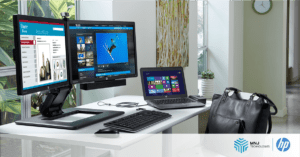Bring your own device (BYOD) policies are changing around the world, and the latest report by Bitglass shows that companies are now much more permissive in this regard, although the shift is likely caused by necessity and not choice.
Not long ago, “bring your own device” meant something concrete. At the start of the year, BYOD policies were a constant worry for any IT department because they meant taking into account unknown security variables.
Then the COVID-19 pandemic hit. Millions of employees started to work from home, changing the paradigm of what BYOD used to mean. Now, people work from home using personal devices, in many cases, logging into the corporate infrastructure from a low-security home network, and sharing work environments with family and friends.
Most businesses have changed their tune and are now more open to accepting BYOD in the workplace, with 69% of respondents in the Bitglass survey saying employees at their companies are allowed to use personal devices to perform their work, while some enable BYOD for contractors, partners, customers and suppliers as well.
As for security concerns, data leakage (63%) remains the most significant risk, followed closely by users downloading unsafe apps or content (57%). Lost or stolen devices, unauthorized access to data and systems, malware, and the inability to control endpoint security are some of the other issues confronted by organizations worldwide.
“About half of the surveyed organizations lack any visibility into file sharing apps (51%), 30% have no visibility or control over mobile enterprise messaging tools, and only 9% have cloud-based anti-malware solutions in place,” the survey revealed.
“Compounding these problems are results that demonstrated that organizations need physical access to devices and even device PINs to secure them. This may be acceptable for managed endpoints, but it is a clear invasion of privacy where BYOD is enabled,” says Bitglass.
Finally, one of the more worrying findings of the survey was that only 42% of the companies had some sort of endpoint malware protection installed on BYO devices. At 30% of the companies questioned, BYO devices were not protected against malware by any software solution.
Stahie, S. (2020, July 13). Most Companies Now Accept BYOD Policies But 30% Don’t Use Endpoint Protection for Those Devices. Retrieved July 22, 2020, from https://businessinsights.bitdefender.com/most-companies-now-accept-byod-policies-but-30-dont-use-endpoint-protection-for-those-devices




